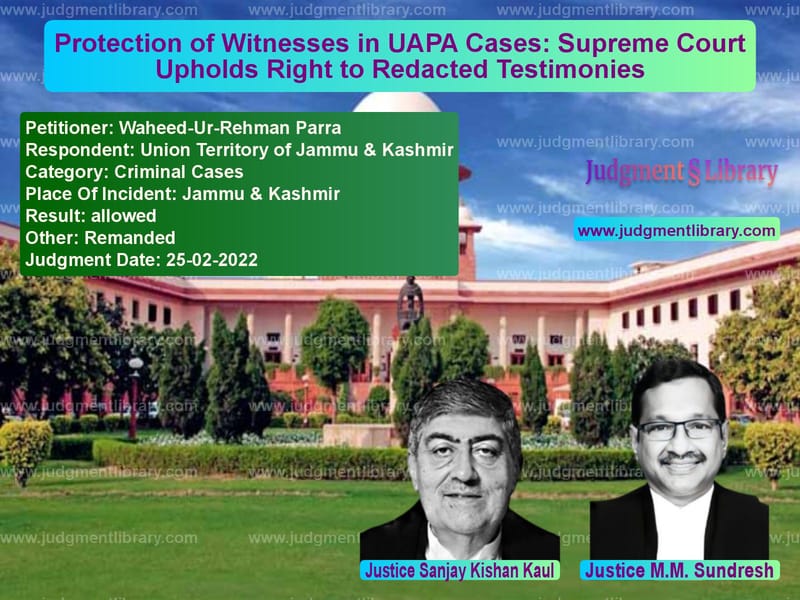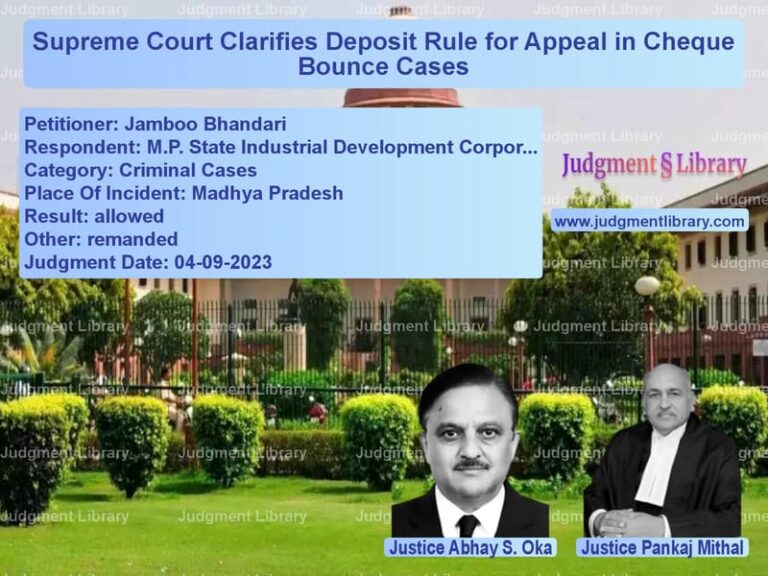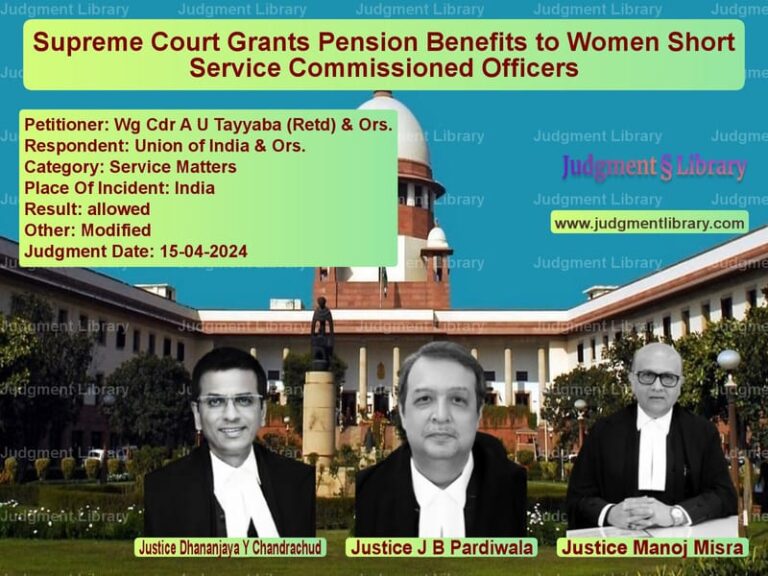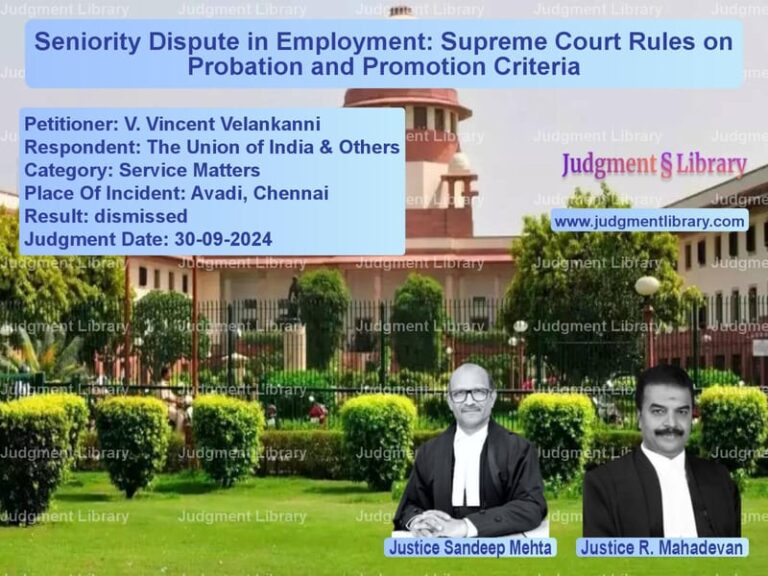Protection of Witnesses in UAPA Cases: Supreme Court Upholds Right to Redacted Testimonies
The case of Waheed-Ur-Rehman Parra vs. Union Territory of Jammu & Kashmir is a significant ruling in the realm of criminal law, particularly concerning the Unlawful Activities (Prevention) Act, 1967 (UAPA). The Supreme Court ruled that an accused has the right to receive redacted copies of protected witnesses’ statements to ensure a fair trial, even when witness identities are withheld for security reasons. The ruling balances national security concerns with the fundamental right to a fair trial.
Background of the Case
The appellant, Waheed-Ur-Rehman Parra, was arrested in connection with FIR No.5/2020, which was initially registered under Sections 18, 19, 20, 38, and 39 of UAPA along with Sections 7/25 of the Arms Act and Sections 3/4 of the Explosive Substances Act. The case was later taken over by the National Investigation Agency (NIA) and re-registered as RC/01/2020/NIA/JMU.
Subsequently, another FIR (No.31/2020) was filed against the appellant under Sections 13, 17, 18, 38, 39, and 40 of UAPA along with Sections 120-B, 121, 121-A, and 124-A of the IPC. The second FIR was based on the same allegations and evidence as the first.
Protection of Witnesses and Sealed Testimonies
The prosecution sought to protect five key witnesses under Section 44 of UAPA and Section 173(6) of Cr.P.C., arguing that disclosure of their identities would endanger their lives. The trial court allowed this request on June 1, 2021, ordering their statements to be sealed.
Petitioner’s Demand for Redacted Statements
The appellant moved the trial court under Section 207 Cr.P.C., requesting copies of the statements of protected witnesses, with their identities and sensitive details redacted. The trial court granted this request on September 11, 2021, holding that:
“While the identity and addresses of protected witnesses must remain confidential, the accused has a right to access the contents of their statements to prepare his defense.”
Respondents’ Challenge to the Trial Court’s Decision
The Union Territory of Jammu & Kashmir challenged this order before the High Court of Jammu & Kashmir and Ladakh, arguing that:
- The trial court’s earlier order (June 1, 2021) already protected the witnesses, and the subsequent order amounted to an improper review.
- Providing even redacted statements could compromise the safety of witnesses.
- The UAPA’s security provisions override general fair trial provisions.
The High Court reversed the trial court’s decision on October 11, 2021, ruling that the accused was not entitled to even redacted copies of the statements.
Supreme Court’s Analysis and Observations
The Supreme Court examined the legal conflict between witness protection and the right to a fair trial. The Court noted that:
“The objective of witness protection is to ensure safety, but it cannot be used to completely deny the accused access to critical testimony.”
The Court analyzed the following provisions:
- Section 173(6) Cr.P.C.: Allows the prosecution to withhold parts of a witness statement if disclosing them is against public interest.
- Section 44 UAPA: Grants courts discretion to protect witness identities if their safety is at risk.
- Section 207 Cr.P.C.: Requires prosecution evidence to be disclosed to the accused, except in cases where security concerns exist.
Supreme Court’s Final Ruling
The Supreme Court ruled in favor of the appellant and restored the trial court’s order, stating:
“The right of an accused to access prosecution evidence cannot be completely denied. The redaction of witness identities and other sensitive details ensures a fair trial while maintaining witness protection.”
Key Directives from the Judgment
- The prosecution must provide redacted copies of the witness statements to the accused.
- Only the identities and personal details of witnesses should be concealed, not the entire statement.
- The trial court’s decision was not a review but a separate ruling under Section 207 Cr.P.C.
- The High Court’s decision was overturned, and the trial court’s order was restored.
Impact of the Judgment
This ruling has significant implications:
- It establishes that UAPA cases must still ensure a fair trial, even when witness protection is involved.
- It clarifies the balance between national security and due process.
- It sets a precedent for limited disclosure rather than absolute non-disclosure of evidence.
- It strengthens judicial oversight over prosecution claims of secrecy.
Conclusion
The Supreme Court’s ruling in Waheed-Ur-Rehman Parra vs. Union Territory of Jammu & Kashmir upholds the right of an accused to access prosecution evidence, even in sensitive UAPA cases. By restoring the trial court’s order for redacted statements, the judgment ensures that national security concerns do not completely overshadow fair trial rights. This landmark ruling will serve as a guiding principle in future cases involving witness protection and disclosure of evidence.
Petitioner Name: Waheed-Ur-Rehman Parra.Respondent Name: Union Territory of Jammu & Kashmir.Judgment By: Justice Sanjay Kishan Kaul, Justice M.M. Sundresh.Place Of Incident: Jammu & Kashmir.Judgment Date: 25-02-2022.
Don’t miss out on the full details! Download the complete judgment in PDF format below and gain valuable insights instantly!
Download Judgment: waheed-ur-rehman-par-vs-union-territory-of-j-supreme-court-of-india-judgment-dated-25-02-2022.pdf
Directly Download Judgment: Directly download this Judgment
See all petitions in Bail and Anticipatory Bail
See all petitions in Judgment by Sanjay Kishan Kaul
See all petitions in Judgment by M.M. Sundresh
See all petitions in allowed
See all petitions in Remanded
See all petitions in supreme court of India judgments February 2022
See all petitions in 2022 judgments
See all posts in Criminal Cases Category
See all allowed petitions in Criminal Cases Category
See all Dismissed petitions in Criminal Cases Category
See all partially allowed petitions in Criminal Cases Category







